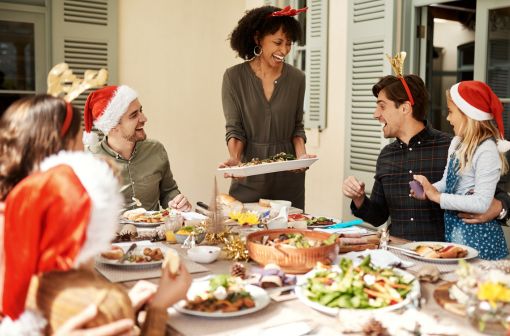“If you're holding onto resentment, if you have any past issues and traumas whatever they may be, make sure you do your own work, and get the help and support you need from a mental health professional.”—Sanja Georgievska, Mental Health Counsellor, Remedy Healthcare
Key points
- Family gatherings can be wonderful, but for some of us they can be fraught with tension.
- Practising self-care before a family event can help to protect your wellbeing. Getting support from a mental health professional can help too.
- Planning ahead can build your confidence. Prepare what you will say if the conversation turns sour, and create an exit strategy.
Traditional, divorced, single, blended, adopted, extended… modern families come in all shapes and sizes. And while that may make get-togethers joyous for many people, for some of us, family gatherings can be an emotional minefield.
Buried grievances might bubble to the surface, or long-held family tensions may suddenly explode—especially at high-expectation events like Christmas, Mother’s Day or significant birthdays.
That’s why we decided to speak to the experts: Nick Tebbey, National Executive Officer of Relationships Australia, a not-for-profit organisation that provides relationship support services for individuals, families and communities, and Sanja Georgievska, Mental Health Counsellor at Australian Unity’s healthcare partner, Remedy Healthcare.
Nick and Sanja share strategies and tips to help us balance our family obligations, protect our own wellbeing and make the time spent at a family gathering go that little bit smoother.

The relationship pressure-cooker
Research from the Australian Unity Wellbeing Index—a long-term study into the wellbeing of Australians, conducted in partnership with Deakin University—tells us that relationships play a pivotal role in our wellbeing. They help us stave off loneliness, feel connected and can support our mental health. Not all relationships are created equal, however. And just because you’re related to someone, it doesn’t necessarily mean you’ll have an easy experience when you’re gathering as a family.
“Especially [during the festive season], you’ve got the combination of high expectations and a lot of pressure points,” says Nick.
Some of these pressure points, Nick explains, are external. The cost-of-living crisis, for example, may cause many families to over-extend themselves at Christmas, exacerbating financial stress. Other sources of tension, meanwhile, stem from the emotional complexities and interpersonal friction that inevitably exist within every family set-up.
“The tensions that we see within families are things like different value systems, different expectations, breaches of trust, or breaches of that sort of relationship support where people thought they could count on someone and suddenly realise they can't,” says Nick. “Those are all issues that certainly raise their head around this time of year.”
Yet Nick stresses that such trigger points can potentially detonate at any family event. Whatever the reason for the gathering, you’ll inevitably be rubbing shoulders with certain relatives you don’t get along with quite as well as others.
“There are often people that stress us out or that we might have had past conflicts or existing tensions with, and you can't avoid them when the whole family is getting together,” says Nick. “These are not our chosen social networks, and these people are not necessarily our friends. We also know through our work at Relationships Australia that a lot of intergenerational and historical trauma can rise to the surface when these big groups get together.”
Find your personal coping strategies
If you’re feeling anxious about a looming family event, Sanja believes the most important thing you can do is to look after yourself in advance. That means practising some consistent form of self-care. Whether it’s reading a book, exercising or going for a walk along the beach, taking time out to do something that makes you feel happy and provides a sense of balance will help you navigate your gathering in a less vulnerable state of mind.
While this may seem self-indulgent when you’re tackling an endless to-do list, Sanja compares it to the instructions on a plane that advise you to put on your own oxygen mask before attending to your child. “If you don't have your mask on, you can’t help your baby,” she explains. The same logic applies to a family event: you can’t effectively fulfill your role as a parent, sibling or emergency peacekeeper if you haven’t attended to your own personal wellbeing.
This advice extends to dealing with those historical issues that may flare up at the get-together. “If you’re holding onto resentment, if you have any past issues and traumas, make sure you do your own work, and get the help and support you need from a mental health professional,” says Sanja. “Doing your individual work can really help and that's a big, big form of self-care too.”
Self-care, she explains, is ultimately about recognising your needs and wants. Establishing that awareness will enable you to set the necessary boundaries that can help to protect your wellbeing at a family event. Perhaps there are some issues you’d prefer not to discuss or obligations you can’t take on. “A person with healthy boundaries is comfortable saying ‘no’ without the fear of rejection,” says Sanja.
.jpg)
Plan ahead for a smoother time
Nick also recommends planning ahead to prepare yourself for difficult scenarios that may play out at your gathering.
“Even having a few key lines prepared in your head like: ‘Look, I prefer not to talk about that right now’, or ‘I don't think this is a helpful conversation for us to be having’ can help,” says Nick. “Having a few key practice lines can really help to arm yourself and make you feel a bit more confident.”
Another tactic, Nick says, is to pre-select someone at the event who you can quietly check in with during proceedings for some moral support. “It might be a spouse or a parent or a cousin, but if there’s a person there who really does have your back, check in with them and find out what they're worried about as well, because this can go both ways.”
Ultimately, however, the success (or failure) of any family gathering is a collective responsibility. Conversations can degenerate, arguments can erupt and old wounds can suddenly re-open. Rather than shying away from that possibility, have a plan for how you can extricate yourself if things start to unravel.
“Have an exit strategy,” recommends Nick. “Have a plan for getting home or leaving early or taking a break if you need to. Even just saying, ‘Look, I'm going to go for a walk, and I'll be back in time for dessert’.
“Having those sorts of plans upfront and going in with a bit of a clear head can do wonders for our confidence and help give us a sense of control over events that otherwise we have very little control over.”
Navigating Christmas as a single dad: Matt’s story
.jpg)
“I used to love Christmas as a kid,” admits Matt*, a divorced father-of-three in Melbourne. “Now I have to admit that I kind of dread it.”
The reason for Matt’s change of heart stems in part of from his family circumstances. Following the break-up of his marriage four years ago, he and his ex-wife alternate having the children on Christmas Day. “This year it’s her turn and, for me, Christmas is all about the excitement of the kids,” says Matt. “Not having them around me on this of all days always stirs up a heap of negative stuff.”
As a form of compromise, their three children will wake up at his house and open their stockings before he ferries them over to his ex-wife’s house. “Those handovers can still end up getting a bit of tense,” concedes Matt. “While things are better between my ex and me now, they’re still not great. I find any form of interaction with her really stressful.”
After dropping off the kids, Matt then faces the emotional volatility of his own family. He’ll head over to Christmas lunch at his parents while bracing himself for a run-in with his brother-in-law. “I honestly can’t stand the guy,” says Matt. “He treats my sister badly and loves sharing all these crazy right-wing views, despite knowing how much they rile me up.”
In terms of how he tries to regulate his feelings on Christmas Day, Matt admits he still hasn’t mastered it. “I just try to make sure I don’t drink too much, as that never helps anything,” he says. “Beyond that, I try and remind myself that it’s only one day a year.”
*Not his real name
.jpg)

